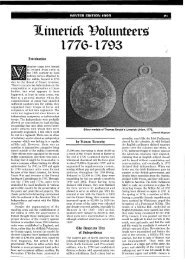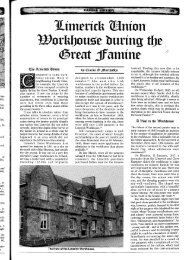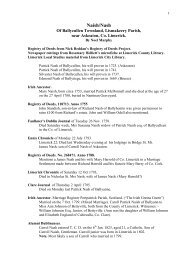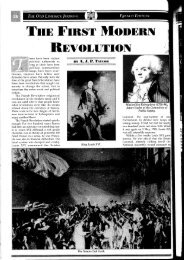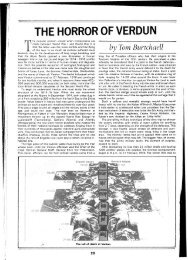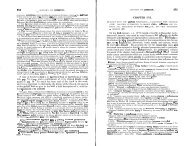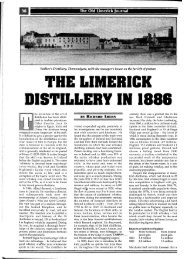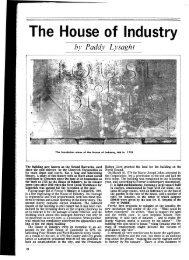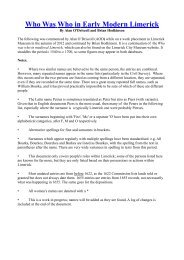The Limerick City Militia 1798 by Kieran Kennedy
The Limerick City Militia 1798 by Kieran Kennedy
The Limerick City Militia 1798 by Kieran Kennedy
You also want an ePaper? Increase the reach of your titles
YUMPU automatically turns print PDFs into web optimized ePapers that Google loves.
Jeremiah Leahy, James Sullivan, Patrick<br />
Nelson, Denis Godfrey, Nicholas Purcell,<br />
Timothy Bryan, Corporal Mahony.18<br />
After returning to Sligo, Col. Vereker<br />
evacuated his forces to Ballyshannon,<br />
leaving the town defenceless. However,<br />
Humbert presumed that Vereker's force<br />
was an advance guard of a much larger<br />
army, and he abandoned his plan to take<br />
Sligo, instead turning southwards to<br />
defeat at Ballinamuck on 8 September.19<br />
Why Col. Vereker left Sligo defenceless is<br />
unknown, but the feeling of the time is<br />
summed up in an article in the Dublin<br />
Evening Post of 29 September 179P0:<br />
"It is now ascertained that the design of<br />
the French General, after he had<br />
retreated from Castlebar, was to take<br />
possession of Sligo, and after pillaging<br />
that town, to proceed nortkwards toward<br />
the Co. of Donegal - and had he<br />
advanced towards Sligo after the affair<br />
with the <strong>Limerick</strong> militia at Colooney,<br />
that town must have fallen into his<br />
hands without opposition, its garrison<br />
having received orders to evacuate it<br />
and fall back to Ballyshannon ... of the<br />
plan of evacuating Sligo, and leaving<br />
that rich and populous town to the mercy<br />
of the enemy .. we cannot presume to<br />
speak; but we earnestly hope that it will<br />
never be thought necessary, under any<br />
circumstances, or in any instance, to<br />
resort to such a measure ..."<br />
Col. Vereker was ordered back to Sligo <strong>by</strong><br />
General Lake, as their absence was<br />
causing much uneasiness in the country.<br />
In <strong>Limerick</strong> and other parts of the<br />
country the action at Collooney was seen<br />
as a great victory over the French. A<br />
meeting of the Common Council in<br />
<strong>Limerick</strong> on 8 October <strong>1798</strong> resolved:<br />
"That the steady, loyal and gallant conduct<br />
of our fellow citizens the <strong>Limerick</strong> <strong>City</strong><br />
Regiment of <strong>Militia</strong>, who ... so intrepidly<br />
engaged and successfully opposed the<br />
progress of the whole French and Rebel<br />
Army ... merits our sincerest thanks and<br />
warmest applause ...". Dublin gave Col.<br />
Vereker the Freedom of the <strong>City</strong>, and<br />
from the High Sheriff and Grand Jury of<br />
Sligo came an address of "our warmest<br />
thanks .. to Col. Vereker ... for his<br />
uncommon exertions and intrepidity<br />
during a very severe action <strong>by</strong> which the<br />
enemy not only received a considerable<br />
check, but were diverted from their<br />
intended attack and pillage of the town of<br />
Sligo, and induced to direct their line of<br />
march another way."<br />
Nobody can doubt Vereker and his<br />
men's bravery. Bartholomew Teeling,<br />
Humbert's aide-de-camp, says "Humbert<br />
bore honourable testimony to the<br />
gallantry of Colonel Vereker, whom he<br />
pronounced the only British Officer he<br />
had encountered in Ireland who was<br />
capable of commanding a hundred men."<br />
Others were less complimentary. Col.<br />
Heyland wrote: "Colonel Vereker<br />
mistaking them for a common mob, drew<br />
out the city of <strong>Limerick</strong> <strong>Militia</strong> and<br />
attacked with only 200 men, but was<br />
obliged to retreat, leaving his battalions<br />
guns etc. Twelve yeomanry had the<br />
courage to fight their front posts but all<br />
were killed or taken prisoner." <strong>The</strong> Dublin<br />
Evening Post account on 8 September <strong>1798</strong><br />
reads: "Colonel Vereker, with a small<br />
detachment of the <strong>Limerick</strong> <strong>City</strong> <strong>Militia</strong>,<br />
hearing that only the rearguard of the<br />
Enemy occupied Colooney, attacked the<br />
town - but, as might be expected, was<br />
repulsed." A letter from an officer in the<br />
Reay Fencibles printed in the same paper<br />
on 25 September says bluntly: "<strong>The</strong><br />
French came that evening to Coloone,<br />
with five miles of Sligo, where they were<br />
met <strong>by</strong> the <strong>Limerick</strong> militia, whom they<br />
defeated and took their cannon from<br />
them."<br />
<strong>The</strong> Dublin Evening Post of 18 October<br />
<strong>1798</strong> reported a meeting of the <strong>Limerick</strong><br />
Common Council: "Resolved that the<br />
sum of fifty guineas be paid <strong>by</strong> our<br />
Chamberlain towards raising a fund to<br />
purchase a suitable piece of Plate for the<br />
Officers' Mess and proper medals for such<br />
of the non-commissioned officers and<br />
privates of the regiment as were engaged<br />
in the action that day." <strong>The</strong> Freeman's<br />
Journal of 24 August 1799 reported: <strong>The</strong><br />
Corporation and Citizens of <strong>Limerick</strong> have<br />
subscribed for very elegant Gold and<br />
Silver medals to be presented to the <strong>City</strong><br />
of <strong>Limerick</strong> <strong>Militia</strong> for their brave and<br />
valorous conduct at Collooney in resisting<br />
the French army under General Humbert,<br />
who sometime ago invaded this kingdom.<br />
<strong>The</strong> Gold medals are for the Serjeants, the<br />
Silver for the Privates; they have been<br />
manufactured <strong>by</strong> Messrs. James Brush<br />
and Son, of St. Andrew's Street, where<br />
they are now to be seen." Brush himself<br />
was probably not the artist of the medal,<br />
as an advertisement of his in 1789 reads in<br />
part: "In the Seal line he presumes to say,<br />
that no Person in this <strong>City</strong> can equal him,<br />
for neatness and durability of settings. He<br />
has engaged an eminent Seal Engraver<br />
from London, specimens of whose work<br />
are ready for inspection."<br />
<strong>The</strong> medal, which is known in silver<br />
only, has on the obverse, the arms of<br />
<strong>Limerick</strong> <strong>City</strong>, a gateway, with portcullis<br />
raised, between a pair of castellated<br />
towers, above, a conical turret with flag<br />
flying, enclosed in a spray of olive and<br />
spray of palm, ends tied, inscribed above,<br />
CORPORATION OF LIMERICK, and<br />
below, OF LIMERICK, and on the reverse,<br />
the imperial crown enclosed in two sprays<br />
of olive, ends tied, inscribed above, TO<br />
THE HEROES OF COLLOONEY, and<br />
below, 5TH SEPR. <strong>1798</strong>, with in smaller<br />
letters between the date and the tied ends<br />
of the sprays, BRUSH.<br />
Colonel Vereker had been elected MP<br />
for <strong>Limerick</strong> city in 1790, and was re-<br />
elected in 1797. In the preparations for the<br />
Act of Union, it is recorded that Lord<br />
Castlereagh was anxious to win his vote,<br />
and having approached him, received the<br />
simple and dignified reply: "Having<br />
defended my country with my blood, I<br />
shall never betray it with my vote." In<br />
every debate he raised his voice against<br />
the Union, and his name is recorded in<br />
every division.21 Others against the Union<br />
raised his conduct at Collooney in the<br />
debates. Mr. Frederick Falkiner said: " ... if<br />
it was not for the unparalleled gallantry of<br />
one regiment who stopped their career ...<br />
the French banditti would have reached<br />
this capital, while his Excellency's<br />
immense army had never seen them." Mr.<br />
Plunkett was even more eager to score off<br />
Lord Cornwallis <strong>by</strong> using Vereker: "I dust<br />
observe that whilst the military L$d<br />
Lieutenant was in the field with an army of<br />
60,000 men to support him, history will<br />
have it to record that we are indebted to a<br />
gallant Irishman (Mr. Vereker) at the<br />
head of about 800 native troops for having<br />
withstood the enemy. and prevented the<br />
capital of Ireland from being entered i~<br />
triumph <strong>by</strong> a body of not one thousand<br />
Frenchmen."22<br />
After the Union, Vereker was again<br />
elected MP (now the sole one) for<br />
<strong>Limerick</strong>. Under the administration of Pitt,<br />
he held the office of Lord of the Treasury<br />
from May 1807 to August 1810. In 1802 he<br />
was appointed Governor of <strong>Limerick</strong>, and<br />
in 1809 Constable of the Castle of<br />
<strong>Limerick</strong>, the last person to hold that<br />
office, which he held until his death in<br />
1842. In 1817 he succeeded his uncle as<br />
second Lord Gort, thus vacati. ' is seat<br />
for <strong>Limerick</strong> which he had regrcsented<br />
continuously for 27 years, having been<br />
elected MP seven times, always <strong>by</strong> large<br />
majorities.23<br />
REFERENCES<br />
1. Harris, R.C.: <strong>The</strong> Irish Regiments,<br />
Nutshell Publishing Co., Kent, 1989<br />
2. Lenihan, Maurice: History of <strong>Limerick</strong>,<br />
1866. p.386<br />
3. Thompson, F. Glenn: <strong>The</strong> UnZforms of<br />
<strong>1798</strong>-1803, Four Courts Press,<br />
Dublin, 1998<br />
4. Lenihan, p.753<br />
5. Lenihan, p.403-404<br />
6. Lenihan, p.405<br />
7. Thompson, op. cit.<br />
8. Lenihan, p.40&409<br />
9. Snoddy, Oliver: <strong>The</strong> <strong>Limerick</strong> Citv<br />
<strong>Militia</strong> and the Battle of Colloonev,<br />
<strong>1798</strong>. North Munster Antiquarian<br />
Journal, Vol. IX, No. 3, 1964<br />
10. Dowd, Rev. James: <strong>Limerick</strong> and Its<br />
Sieges, McKern, <strong>Limerick</strong>, 1890,<br />
appendix<br />
11. Van Brock, F.W.: A Memoir of <strong>1798</strong>,<br />
<strong>The</strong> Irish Sword, 1970<br />
12. Dowd, op. cit.<br />
13. Van Brock, op. cit.<br />
14. Major Orms<strong>by</strong>'s detachment was, in<br />
fact, stationed here<br />
15. Lenihan, p.411<br />
16. Snoddy, op. cit.<br />
17. Bourke, F.S.: <strong>The</strong> French Invasion of<br />
<strong>1798</strong>: A Forgotten Evewitness, <strong>The</strong><br />
Irish Sword, 1956<br />
18. Lenihan, p.410-411<br />
19. Snoddy, op. cit.<br />
20. This and other contemporary<br />
reactions are given in Snoddy, op. cit.<br />
21. Lenihan, p.413<br />
22. Snoddy, op. cit.<br />
23. Lenihan, p.415



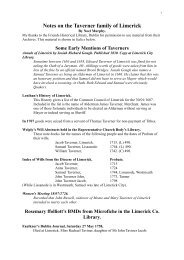

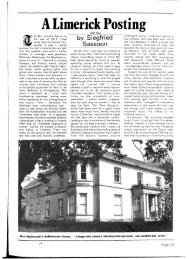
![The Galbally farmer [poem] by Darby Ryan - Limerick City Council](https://img.yumpu.com/24792577/1/190x260/the-galbally-farmer-poem-by-darby-ryan-limerick-city-council.jpg?quality=85)
